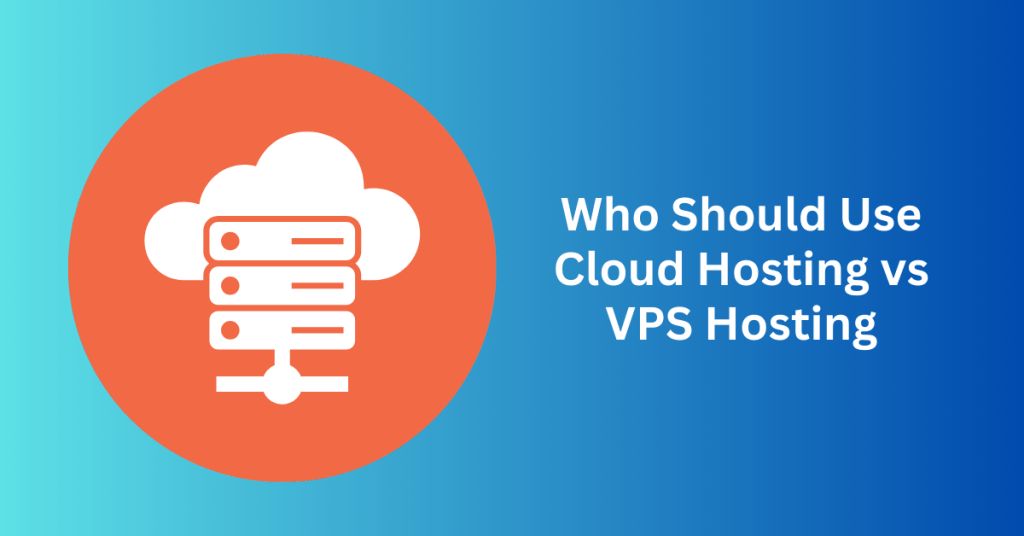When you’re tasked with selecting the right hosting solution for your business, it’s a matter of time before you compare cloud hosting and virtual private server (VPS) hosting.
Both hosting types are equally valid choices for mid-sized companies since they offer the power and versatility a growing business requires — without breaking the budget with an overly higher-end hosting solution.
While cloud and VPS are similar in many ways, they’re very different in others. That’s why deciding on cloud hosting vs. VPS hosting will depend on your specific business needs. This guide will cover the major differences, why they would matter, and how to choose the optimal option for your situation.
Start Your Web Hosting Today with Exclusive Deals
What is VPS Hosting

VPS (Virtual Private Server) hosting utilizes virtualization technology, commonly referred to as a hypervisor, to create multiple virtual servers from a single physical machine. This process involves dividing one physical server into several isolated virtual environments, each functioning independently. Every virtual server, or VPS, is allocated its own dedicated resources such as CPU, RAM, bandwidth, and storage.
VPS hosting is particularly suited for mid-sized businesses that have outgrown shared hosting solutions but are not yet ready for the investment required for dedicated server hosting. This middle ground offers enhanced performance, greater control, and better security compared to shared hosting, without the high costs associated with dedicated servers.
Key Features of VPS Hosting
1. Dedicated Resources
VPS (Virtual Private Server) hosting provides dedicated resources to each user. Unlike shared hosting, where multiple users share the same server resources, VPS hosting allocates specific amounts of CPU, RAM, and disk space to each virtual server. This ensures that your website’s performance is not affected by other websites on the same physical server.
With dedicated resources, you can handle higher traffic and more demanding applications, leading to a more stable and reliable hosting environment.
2. Scalability
One of the significant advantages of VPS hosting is its scalability. As your website or application grows, you can easily upgrade your resources without experiencing downtime. This flexibility is crucial for businesses that anticipate growth or have fluctuating traffic patterns.
You can start with a smaller plan and scale up your resources, such as increasing CPU, RAM, or storage, as needed. This ensures that your hosting solution can evolve with your needs, providing both cost efficiency and room for growth.
3. Root Access
VPS hosting typically includes root access, giving you complete control over your virtual server. This level of access allows you to install and configure any software, modify server settings, and manage security protocols according to your preferences.
Besides, root access is especially beneficial for developers and advanced users who need a customizable environment to run specific applications or services. It provides the freedom to optimize the server for your particular use case, ensuring maximum performance and functionality.
4. Isolation
Each VPS operates in isolation from other virtual servers on the same physical hardware. This isolation enhances security and stability because issues on one VPS do not affect others. For example, if another user’s VPS is compromised or experiences a spike in traffic, your VPS remains unaffected.
This separation is achieved through virtualization technology, which creates independent environments on the same physical server. It ensures that your data is secure and your server’s performance is consistent.
5. Cost-Effectiveness
VPS hosting strikes a balance between the affordability of shared hosting and the power of dedicated hosting. While it is more expensive than shared hosting, it is significantly cheaper than renting an entire physical server. VPS hosting allows you to enjoy many of the benefits of a dedicated server, such as dedicated resources and enhanced performance, at a fraction of the cost.
This makes it an attractive option for small to medium-sized businesses that need reliable hosting without the high costs associated with dedicated servers.
6. Customization
With VPS hosting, you have a high degree of customization available. You can choose the operating system, control panel, and software that best meets your needs. This level of customization is not possible with shared hosting, where configurations are often fixed. Being able to tailor your server environment to your specific requirements can enhance performance, security, and user experience.
Whether you need a particular software stack or specific server configurations, VPS hosting offers the flexibility to create an optimized hosting environment.
7. Improved Security
VPS hosting offers enhanced security features compared to shared hosting. Since each VPS is isolated, the risk of cross-contamination from other users on the same server is minimized. You can implement your own security measures, such as firewalls, intrusion detection systems, and regular backups.
Additionally, many VPS hosting providers offer advanced security features like DDoS protection and automated security updates. These measures ensure that your data and applications are safeguarded against potential threats.
8. Performance and Reliability
The dedicated resources and isolation provided by VPS hosting result in better performance and reliability for your website or application. You are less likely to experience slowdowns or downtime caused by other users’ activities. This consistent performance is critical for maintaining a positive user experience, particularly for e-commerce sites, high-traffic blogs, or business applications that require reliable uptime.
The stability of VPS hosting makes it a preferred choice for businesses that cannot afford interruptions or performance issues.
Typical use cases for VPS hosting
1. Websites with Moderate and Stable Traffic
Websites that experience consistent, moderate levels of traffic benefit from the reliability and dedicated resources of a VPS, ensuring smooth performance and user experience.
2. Small to Medium-Sized eCommerce Stores
Online stores that require more robust performance and security than shared hosting can provide, yet don’t necessitate the full capacity of a dedicated server, often find VPS hosting ideal.
3. Software Development and Testing Environments
Developers use VPS hosting to create staging and testing environments that mimic live conditions without the risk of disrupting a production site.
4. Web Developers and Agencies
Professionals managing multiple client websites prefer VPS hosting for its ability to offer segregated environments, ensuring that issues in one client’s site do not affect others.
5. Users Requiring Advanced Server Configuration
VPS hosting grants users greater control over server settings, software installations, and overall configuration. Hence, making it a favoured choice for those with specific technical requirements.
Start Your Web Hosting Today with Exclusive Deals
What is Cloud Hosting

Cloud hosting, much like VPS hosting, utilizes virtualization technology, but it takes a more decentralized approach. The term “cloud” refers to a distributed network of physical servers located in various data centers around the world. By leveraging this network, cloud providers offer remote access to a scalable and flexible computing environment.
One of the primary advantages of cloud hosting is its maximum scalability. Thanks to the extensive and distributed network of servers, providers can easily allocate additional computing resources to your project as needed. This scalability ensures that your computing power can grow alongside your demands without significant delays or overhauls.
Cloud hosting plans employ hypervisors in conjunction with orchestration tools that automatically allocate resources to users. This not only allows for on-demand provisioning of resources but also enables automatic load balancing. As a result, if your project’s resource usage approaches its limit, the system can dynamically provide more cloud computing power to maintain optimal performance.
Cloud hosting is suitable for businesses of any size due to its flexibility and cost-effectiveness. Pay-as-you-go models are common, allowing businesses to pay only for the resources they use. Additionally, cloud hosting typically supports customizable specifications and scalable solutions, making it an adaptable choice for various needs.

Key Features of Cloud Hosting
1. Scalability
Cloud hosting is renowned for its scalability, allowing users to easily adjust resources according to their needs. Unlike traditional hosting solutions that may require downtime for hardware upgrades, cloud hosting can dynamically allocate additional resources like CPU, RAM, and storage on demand. This flexibility is particularly beneficial for businesses with fluctuating traffic or those anticipating growth.
By leveraging a network of servers, cloud hosting ensures that you can scale your operations seamlessly without interruptions, providing a responsive and adaptable environment for your applications.
2. Reliability and Uptime
One of the most significant advantages of cloud hosting is its reliability and high uptime. Cloud hosting utilizes a network of interconnected servers, ensuring that if one server fails, another can seamlessly take over the load. This redundancy minimizes the risk of downtime and ensures continuous operation.
Additionally, cloud hosting providers often guarantee higher uptime percentages, sometimes as high as 99.99%, which is crucial for businesses that rely on their online presence to generate revenue and maintain customer trust.
3. Performance
Cloud hosting offers enhanced performance through load balancing and optimized resource distribution. The infrastructure distributes traffic across multiple servers, preventing any single server from becoming a bottleneck. This results in faster load times and a smoother user experience, even during peak traffic periods.
Furthermore, cloud hosting providers often use state-of-the-art hardware and caching technologies to further enhance performance. The ability to leverage multiple servers for processing power ensures that applications run efficiently and responsively.
4. Cost-Efficiency
Cloud hosting operates on a pay-as-you-go model, making it cost-efficient for many businesses. Instead of paying for fixed resources that may go underutilized, you only pay for the resources you actually use. This model can result in significant cost savings, particularly for businesses with variable or unpredictable workloads.
Additionally, there are no upfront costs for purchasing and maintaining hardware, as these expenses are absorbed by the cloud provider. This financial flexibility allows businesses to allocate resources more effectively and scale their operations without incurring prohibitive costs.
5. Global Reach
With cloud hosting, businesses can leverage a global network of data centers to reach users worldwide. Cloud providers have multiple data centers spread across different geographic locations, allowing you to deploy your applications closer to your target audience. This reduces latency and improves the user experience by delivering content more quickly.
For businesses operating in multiple regions, this global reach ensures consistent performance and reliability for users regardless of their location.
6. Security
Cloud hosting providers prioritize security, offering robust measures to protect your data and applications. These measures often include data encryption, firewalls, intrusion detection systems, and regular security updates. Additionally, cloud providers typically employ dedicated security teams to monitor and address potential threats. The multi-layered security infrastructure of cloud hosting ensures that your data remains protected against cyber-attacks and unauthorized access.
Many providers also comply with industry standards and regulations, offering peace of mind for businesses handling sensitive information.
7. Disaster Recovery
Cloud hosting includes advanced disaster recovery options, ensuring business continuity in the event of data loss or system failure. By storing data across multiple servers and locations, cloud hosting provides a built-in redundancy that facilitates quick recovery. Automated backups and snapshots allow you to restore your data to a previous state with minimal downtime.
This level of preparedness is crucial for maintaining operations and protecting against data loss due to hardware failures, natural disasters, or cyber incidents.
8. Ease of Management
Managing a cloud hosting environment is simplified through user-friendly control panels and automated management tools. Most cloud hosting providers offer intuitive interfaces that allow users to easily configure, monitor, and manage their resources. Features like automated scaling, backups, and updates reduce the complexity of server management, allowing businesses to focus on their core activities.
Additionally, many cloud providers offer managed services, where they handle the technical aspects of maintenance and support, further easing the burden on in-house IT teams.
Start Your Web Hosting Today with Exclusive Deals
Typical use cases for cloud hosting platforms
1. Web Hosting with Fluctuating Traffic: Websites experiencing variable traffic levels benefit from the cloud’s ability to scale resources up or down based on current demand, ensuring consistent performance.
2. Resource-Intensive Applications: Applications requiring extensive computing resources can leverage the cloud’s scalable infrastructure to meet high demands efficiently.
3. SaaS Platforms: Software-as-a-service platforms that require continuous availability and reliability can rely on cloud hosting to provide the necessary uptime and performance for their users.
Industry trends
Cloud hosting has emerged as the most popular and widely adopted alternative to VPS hosting. A significant indicator of its dominance is the stark difference in market share, with 94% of enterprises utilizing cloud services. This widespread adoption is reflected in the rapidly increasing investment in cloud infrastructure, which saw a growth of 21% in the first quarter of 2024 alone. The competitive landscape among cloud providers is intense, with companies constantly vying for the top position, leading to shifts in market share on a yearly basis.
However, despite the ascendancy of cloud hosting, many mid-sized businesses continue to rely on VPS solutions. There are specific scenarios where VPS hosting proves to be more advantageous than cloud hosting. Understanding these distinctions can help businesses make informed decisions about which hosting solution best suits their needs.
Start Your Web Hosting Today with Exclusive Deals
Cloud hosting vs. VPS hosting

Several key factors come into play while comparing VPS hosting vs. cloud hosting. Cloud tends to outperform VPS in performance, scalability and reliability. VPS is usually the winner in terms of cost-effectiveness and ease of use. With other factors, like security and maintenance, your unique project requirements and preferred hosting provider should guide your decision.
The main factors we’ll compare are price, performance, security, scalability, reliability and maintenance. Sit tight to see how cloud hosting and VPS hosting stack up.
Price
When it comes to cost-effectiveness, VPS hosting offers a clear advantage. You generally pay a fixed monthly fee for dedicated resources, simplifying budgeting for hosting expenses. This stability is particularly beneficial for businesses with consistent workloads or strict budgets.
In contrast, cloud hosting typically features a more flexible pricing model with pay-as-you-go options. This allows you to adjust resources based on demand. However, this flexibility often comes with higher rates per resource. While you can save money during periods of low activity, unexpected high usage can lead to surprisingly high bills.
Consider a small business owner running an eCommerce store with moderate but predictable traffic. In this case, VPS hosting would likely be more affordable.
On the other hand, if you are the same eCommerce store owner but experience significant seasonal traffic spikes, VPS hosting would require a more expensive plan to handle peak usage. With cloud hosting, resources scale as needed, so you pay more during high-traffic periods but save money during quieter times.
Performance
Performance is a critical concern when running any database, website, or application. Both cloud and VPS hosting can deliver high performance, but cloud hosting typically has the edge due to its scalable architecture.
Cloud servers are designed to manage dynamic workloads by distributing them across multiple servers. This means that even during traffic spikes and heavy resource usage, cloud servers can use autoscaling to prevent slowdowns and downtime.
In contrast, VPS hosting relies on a single physical server, which has a limited capacity for handling heavy loads. This limitation can be mitigated by optimizing server configurations and investing in better hardware, but it still cannot match the performance capabilities of a cloud network.
However, if your projects are straightforward, such as improving the performance of your WordPress website or online store, VPS hosting can still effectively meet your needs.
Security
Security is a significant consideration for any business. Both cloud and VPS hosting offer secure environments for your data, but how do they compare?
Cloud hosting has an advantage due to its distributed and redundant nature, with data stored across multiple servers and locations. However, this distribution has also led to notable security breaches, even among top-tier enterprises like Facebook and Amazon. Despite this, cloud hosting is not defenceless. Instead, it is typically managed for you, with technicians promptly installing security patches. Cloud hosting often includes DDoS protection, web application firewalls, encryption, and timely backups.
VPS hosting, on the other hand, relies on a single physical server. This setup is less redundant but offers more isolation. You can enhance your VPS with robust security measures, turning it into a fortress against cyberattacks. VPS plans usually offer root access, allowing you to install comprehensive security programs. However, this requires effort from you and your team to maintain.
Scalability
Scalability refers to the ability to adjust server resources to meet changing demands. In this regard, cloud hosting consistently outperforms VPS hosting.
With its expansive infrastructure and programs that automatically provision servers in response to changing workloads, cloud hosting enables businesses to quickly respond to traffic spikes.
In contrast, VPS hosting relies on a single physical setup with fixed resource allocations. While it’s possible to set up clusters of physical servers and configure a load-balancing program to distribute traffic across multiple virtual machines, cloud hosting offers these capabilities inherently.
Reliability
When it comes to reliability, cloud hosting holds a clear advantage over VPS hosting due to its inherent redundancy.
Cloud hosting is designed to be fault-tolerant, with built-in failover mechanisms that ensure uninterrupted service. If one cloud server experiences issues, another server is ready to take its place, minimizing downtime.
On the other hand, VPS hosting relies on a single physical server, so if that server goes down, your website or app will also experience downtime. While load balancing strategies can mitigate some of the impacts and investing in redundant VPS infrastructure can help, it still can’t match the reliability provided by the distributed nature of cloud hosting.
Maintenance
Both VPS and cloud hosting require distinct types of maintenance.
Fully understanding how to set up and troubleshoot cloud stacks can be complex, often necessitating a dedicated technical team. Fortunately, many cloud hosting providers offer managed cloud hosting, which relieves you of maintenance tasks such as updates and backups. Additionally, some cloud hosting services provide round-the-clock support, ensuring that you always have an expert available to assist with any issues.
VPS hosting is generally less technically complicated. However, you might be responsible for server installation and maintenance, as unmanaged VPS hosting is more common. While managed cloud hosting is often the default and easier for beginners, it offers less control compared to VPS hosting.
Who Should Use Cloud Hosting vs VPS Hosting

Cloud hosting stands out as the top pick for business owners in pursuit of ultimate flexibility, scalability, and performance. Thanks to its expansive infrastructure, pay-as-you-go pricing, and effortless maintenance, cloud hosting proves beneficial for various scenarios:
1. Startups and growing businesses: Cloud hosting empowers startups to adjust resources as required without hefty initial investments. Should growth surge unexpectedly, there’s no need to hastily migrate to a new hosting provider.
2. Businesses of all sizes: Cloud infrastructure grants the precise utilization of resources at any given time — no surplus, no shortage.
3. eCommerce ventures: The dynamic nature of eCommerce necessitates scalable infrastructure. Seasonal spikes and promotional peaks can cause traffic surges, but paying for maximum capacity year-round is an unnecessary drain on resources. Adopting a pay-as-you-go model can provide substantial savings.
4. SaaS providers: Cloud infrastructure furnishes software providers with reliable support to ensure uninterrupted service for their clientele. Moreover, cloud platforms offer the flexibility to adjust resource allocation in response to user demand.
VPS hosting is particularly well-suited for:
Medium to large businesses: Established enterprises with steady workloads find VPS hosting more economical compared to cloud hosting. Predictable usage patterns make VPS hosting a cost-effective choice.
Companies seeking customization and control: Business owners desiring complete autonomy over their server environment often lean towards VPS hosting. Cloud infrastructure typically comes fully managed, which may not align with the need for extensive customization. Developers may find it easier to work with the advanced features of VPS hosting.
Businesses operating on a budget: While pay-as-you-go models offer flexibility, they can also introduce stress due to fluctuating costs, especially for those adhering to strict budgets. Opting for fixed pricing through VPS plans provides stability, particularly if your workload remains consistent and your VPS server is capable of meeting project requirements.
Start Your Web Hosting Today with Exclusive Deals
Summary of Cloud hosting vs VPS hosting
Here is a table summarizing the key differences between Cloud Hosting and VPS Hosting:
| Feature | Cloud Hosting | VPS Hosting |
| Scalability | Highly scalable; resources can be added on demand | Scalable, but may require manual adjustments |
| Reliability and Uptime | Extremely reliable due to network of servers; high uptime guarantee | Reliable, but dependent on single physical server; moderate uptime guarantee |
| Performance | Enhanced performance with load balancing and multiple servers | Good performance with dedicated resources but limited by single server capacity |
| Cost | Pay-as-you-go model; cost-effective for variable workloads | Reliable, but dependent on the single physical server; moderate uptime guarantee |
| Global Reach | Uses global data centers to reduce latency | Limited to the location of the physical server |
| Security | Robust security with multiple layers and compliance standards | Enhanced security, but dependent on user configurations |
| Disaster Recovery | Advanced disaster recovery with data redundancy across servers | Fixed monthly cost; typically more affordable than the cloud for consistent workloads |
| Ease of Management | User-friendly control panels, automated management tools, and managed services | Requires more technical knowledge, with root access for full control |
| Customization | Good disaster recovery with snapshots and backups but limited to a single server | Customizable environment with root access, but limited by physical server capabilities |
| Cost-Effectiveness | More cost-effective for high and variable resource needs | More cost-effective for stable and predictable resource needs |
Final thoughts: Cloud Hosting vs. VPS Hosting: Everything You Need to Know
Choosing between cloud hosting and VPS hosting can be challenging due to their similarities, but several key differences will help determine which is the best fit for your business. Cloud computing offers the most flexibility and versatility, whereas VPS provides a reliable option and serves as a step towards dedicated hosting.
Once you’ve made your decision, consider Bluehost’s managed cloud and VPS hosting, both of which come with a 100% network uptime guarantee. Whether you opt for the scalability of cloud hosting or the stability of VPS, Bluehost robust hosting infrastructure will support your business.


